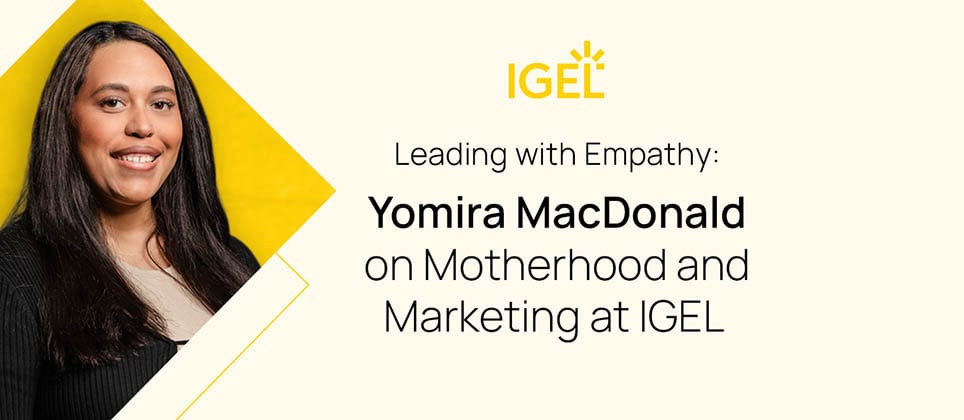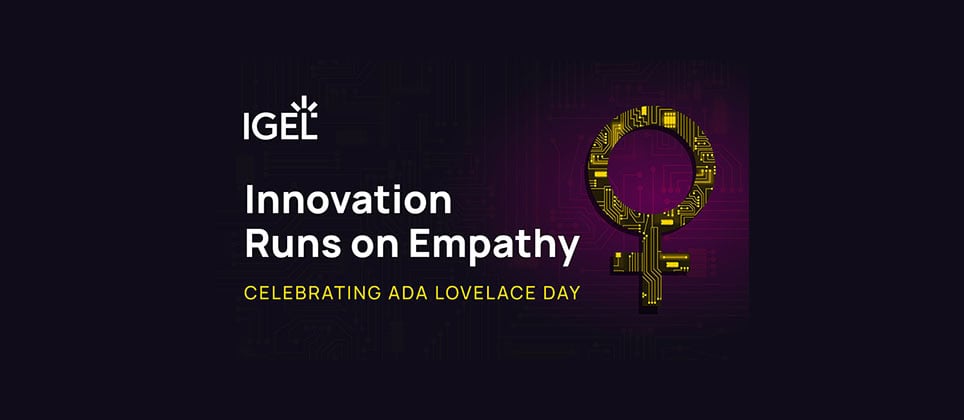IGEL Blog

Celebrating the Contributions of Women in Engineering: Insights from IGEL4Women
At IGEL, the team driving zero-trust innovation and redefining endpoint security includes women who are transforming how secure workspaces are built and managed globally. Therefore, we are proud to join the global community in commemorating International Women in Engineering Day (#INWED25), a day dedicated to honouring the achievements of women in tech and promoting diversity across technology sectors.
To celebrate #INWED25, we’re spotlighting three talented women, Ruth Hazeldine, Customer Experience Operations Manager; Emese Pogany, Technical Writer; and Katja Gröblinghoff, Team Lead – Customer Licensing, as they share their personal journeys in the field of technology. In this Q&A, each of these women reflects on what inspired them, the challenges they’ve faced, and the advice they’d give to the next generation of engineers.
Which skills do you believe are most essential for success in the current tech environment?
Ruth Hazeldine: In Sales Operations, requirements analysis and problem-solving skills are essential. You need the ability to actively listen to problem statements and translate them into clear, actionable requirements. It is also valuable to be able to change your communication style to effectively engage both technical and non-technical stakeholders.
Emese Pogany: As technology rapidly evolves, the ability to continuously learn and teach oneself new tools, technologies, or concepts is absolutely vital. It is also important to recognise when you’re stuck and seek help.
Katja Gröblinghoff: I think it is always a combination of being a specialist in your area and knowing the technical details on the one hand, and a self-confident attitude on the other hand, which includes being able to present yourself and being communicative.
Can you share a moment in your career when you felt especially proud to be a woman working in tech?
Ruth Hazeldine: When a third-party software vendor provided feedback to our VP of Customer Success, they highlighted how exceptional it was working with us due to the thoroughness of our testing process. It was clear that this was a subtle reference to my contributions, and I truly appreciate the recognition.
Emese Pogany: It was a home office moment when my niece saw me work and found it really cool. She said she would also work like me when she grows up. I realised then that I am showing her an example of what is possible as a girl.
Katja Gröblinghoff: When I was at university and studied computer science, I was one of the very few female students among several hundred students. Sometimes a professor asked us a question during their lectures, and I was one of the few students who could answer those questions. That made me proud—especially as a woman—and proved to me that I was in the right place.
What advice would you give to young women or girls considering a career in STEM?
Ruth Hazeldine: Ensure you’re addressing the underlying question behind the request. It’s crucial to understand what you’re developing to avoid investing time in a project that may end up not getting used.
Emese Pogany: Believe in yourself, be brave and stay curious. I think STEM is great because science doesn’t ask “who is thinking?”. We can all be great thinkers and problem solvers.
Katja Gröblinghoff: If you are interested in one of these areas, simply go that route and don’t think about how many male or female fellow students or colleagues there might be. They are all human. And I think it is most important to work in a field you like. Because you will likely do this most of your life.
Have there been any role models or mentors who’ve made a big impact on your journey?
Ruth Hazeldine: Irene Stenzel-Hampe was my role model; she was an amazing project manager who could retain huge amounts of information and talk to sub-projects in detail, and ask questions that enabled other people to think through the knock-on impact of today’s business decisions.
Emese Pogany: I had a physics teacher in primary school, who always admired my quick thinking but always criticised my complicated way of thinking. She challenged me a lot to become a better thinker. She was a great science teacher.
Katja Gröblinghoff: My math teacher at high school made an impact. She was brilliant and taught us a lot. And thus, I felt I could be brilliant and successful in STEM as well, regardless of my gender.
What are some of the challenges you’ve faced as a woman in tech, and how did you overcome them?
Ruth Hazeldine: I initially struggled to provide high-level summaries of topics, often getting bogged down in the details. However, I overcame this challenge by seeking guidance from a mentor through the IGEL Mentorship Program, who helped me develop the ability to step back and focus on the broader picture.
Emese Pogany: One challenge I encountered, especially earlier in my career, was not always being taken seriously, partly because I look quite young. Despite being highly dedicated and serious about my work, I sometimes felt that my appearance led others to underestimate my capabilities. To address this, I took part in several communication training sessions where I picked up practical techniques, such as lowering my vocal tone and slowing my speech pace, which can project more authority. I began incorporating these changes initially without even realising it, and over time, I noticed a difference in how I was perceived. Whether it’s the shift in my communication style, the added experience, or simply growing into my professional presence, I feel that I’m now heard and respected in ways that weren’t always the case before.
Katja Gröblinghoff: I’ve often encountered situations where my input wasn’t acknowledged until someone else repeated the same point, then it was accepted without question. Overcoming this challenge can be difficult, but I’ve found that asserting myself more confidently, sometimes even just by speaking louder or with more emphasis, can make a difference.
Is there something you wish you’d known earlier in your career?
Ruth Hazeldine: 80% solutions that get used are better than 100% perfect solutions that never get used.
Emese Pogany: That I do need to challenge the “be quiet and try not to be in the way” status quo. What truly matters is the strength of the idea, not who it comes from. I’ve learned that speaking up, listening actively, and creating space for all voices fosters not only better outcomes, but also a more respectful and inclusive environment.
What’s the best piece of career advice you’ve ever received?
Ruth Hazeldine: Work doesn’t have to be too serious…think of it as a game to be played and won!
Emese Pogany: Dare to be yourself at work, including your shortcomings. Not because that is the most profitable, but because that is the healthiest and it will make you happy on the long run.
What changes would you like to see in the next 5–10 years for women in tech?
Emese Pogany: While diversity in tech has improved in terms of representation, there’s still work to be done in truly valuing different perspectives and approaches. For example, for me, honesty is one of the most important practices in life and in business. It would be great to appreciate honesty as much as being smart and clever.
Katja Gröblinghoff: I would love women and men to be equally accepted especially in the higher management because I think here are even less women in that area then generally in tech roles.
At IGEL, we believe innovation thrives when it reflects the full spectrum of talent—across gender, background, and perspectives. IGEL4Women has hosted engineering-led panels at IGEL events throughout the U.S. and Europe, and champions representation across our Secure-by-Design OS initiatives, Adaptive Secure Desktop, and sustainability-focused development streams. We also proudly support International Women’s Day and Ada Lovelace Day, collaborating with external women-in-tech networks to broaden access and advocacy.
“As we observe International Women in Engineering Day, it’s heartwarming to consider the ongoing initiatives to create equitable growth opportunities for all,” said Kate Waddington, VP of HR for EMEA & APAC at IGEL. “We acknowledge the industry-wide challenges in promoting and retaining women in technology and are working to address these gaps. One way is through the IGEL4Women resource group, which has actively hosted panel discussions at IGEL events in the U.S. and Germany. We also sponsor activities each year for International Women’s Day and Ada Lovelace Day, and we actively participate in women-in-technology-focused events around the globe.”
Join the conversation: IGEL4Women is building a global network of engineers, designers, and tech leaders redefining secure, inclusive endpoints. Learn more or nominate a speaker for our next panel at IGEL Now & Next Frankfurt. We’re also hiring software engineers, QA testers, and cybersecurity architects committed to innovation and inclusion. Explore the available positions at IGEL Careers.


